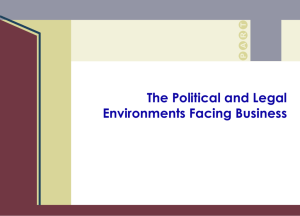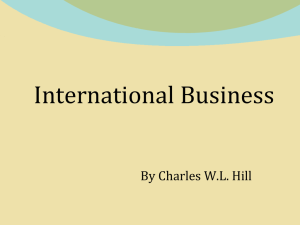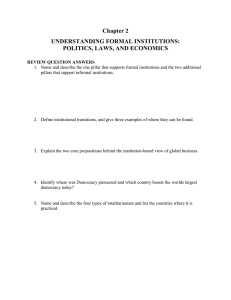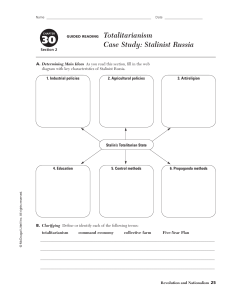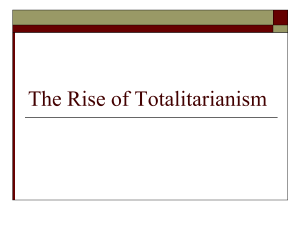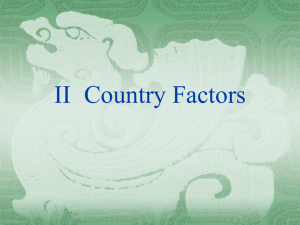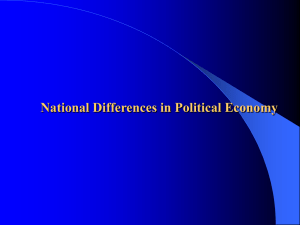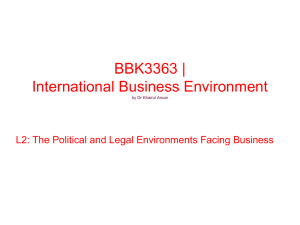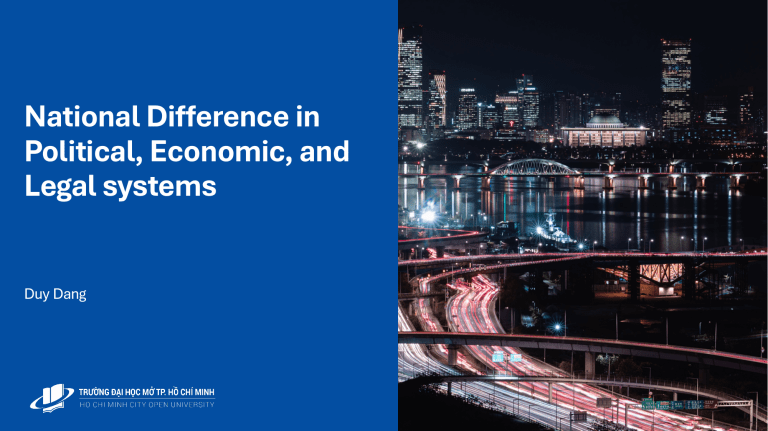
National Difference in Political, Economic, and Legal systems Duy Dang What is political economy • Political economy of a nation - how the political, economic, and legal systems of a country are interdependent • they interact and influence each other • they affect the level of economic well-being in the nation • Political system - the system of government in a nation • Assessed according to • the degree to which the country emphasizes collectivism as opposed to individualism • the degree to which the country is democratic or totalitarian Collectivism • Collectivism stresses the primacy of collective goals over individual goals • can be traced to the Greek philosopher, Plato (427-347 BC) • Today, collectivism is equated with socialists (Karl Marx 1818-1883) • advocate state ownership of the basic means of production, distribution, and exchange • manage to benefit society, rather than individual capitalists • In the early 20th century, socialism split into • Communism – socialism can only be achieved through violent revolution and totalitarian dictatorship in retreat worldwide by the mid-1990s • Social democrats – socialism is achieved through democratic means • retreating as many countries move toward free market economies • state-owned enterprises have been privatized Individualism • Individualism refers to the philosophy that an individual should have freedom in his own economic and political pursuits • can be traced to Greek philosopher, Aristotle (384- 322 BC) • individual diversity and private ownership are desirable • individual economic and political freedoms are the ground rules on which a society should be based • implies democratic political systems and free market economies Democracy • Democracy - a political system in which government is by the people, exercised either directly or through elected representatives • usually associated with individualism • pure democracy is based on the belief that citizens should be directly involved in decision making • most modern democratic states practice representative democracy where citizens periodically elect individuals to represent them Totalitarianism • Totalitarianism - form of government in which one person or political party exercises absolute control over all spheres of human life and prohibits opposing political parties • Four major forms of totalitarianism exist today • Communist totalitarianism – found in states where the communist party monopolizes power • Theocratic totalitarianism - found in states where political power is monopolized by a party, group, or individual that governs according to religious principles • Tribal totalitarianism - found in states where a political party that represents the interests of a particular tribe monopolizes power • Right-wing totalitarianism - permits some individual economic freedom, but restricts individual political freedom Pseudo-Democracies • lie between pure democracies and complete totalitarian systems of government. • They might be described as imperfect or pseudo-democracies, • where authoritarian elements have captured some or • much of the machinery of the state and use this in an attempt to deny basic political and civil liberties. • Russia, China Link between political ideology and economic system • Political ideology and economic systems are connected • countries that stress individual goals are likely to have marketbased economies • in countries where state ownership is common, collective goals are dominant Economic system • Market economies - all productive activities are privately owned, and production is determined by the interaction of supply and demand • government encourages free and fair competition between private producers • Command economies - government plans the goods and services that a country produces, the quantity that is produced, and the prices at which they are sold • all businesses are state-owned, and governments allocate resources for “the good of society” • because there is little incentive to control costs and be efficient, command economies tend to stagnate • Mixed economies-certain sectors of the economy are left to private ownership and free market mechanisms while other sectors have significant state ownership and government planning • governments tend to own firms that are considered important to national security Legal system • Legal system - the rules that regulate behavior along with the processes by which the laws are enforced and through which redress for grievances is obtained • the system in a country is influenced by the prevailing political system • Legal systems are important for business because they • define how business transactions are executed • identify the rights and obligations of parties involved in business transactions • There are three types of legal systems • Common law - based on tradition, precedent, and custom • Civic law - based on detailed set of laws organized into codes • Theocratic law - law is based on religious teachings In business context • Contract – a document that specifies the conditions under which exchange is to occur and details the rights and obligations of the parties involved • Contract law is the body of law that governs contract enforcement • under a common law system, contracts tend to be very detailed with all contingencies spelled out • under a civil law system, contracts tend to be much shorter and less specific because many issues are already covered in the civil code • The United Nations Convention on Contracts for the International Sale of Goods (CIGS) • establishes a uniform set of rules governing certain aspects of the making and performance of everyday commercial contracts between buyers and sellers who have their places of business in different nations • Ratified by the U.S. and about 70 countries • but, many larger trading nations including Japan and the U.K. have not agreed to the provisions of CIGS and opt for arbitration instead Property rights and corruption • Property rights - the legal rights over the use to which a resource is put and over the use made of any income that may be derived from that resource • Property rights can be violated through • Private action – theft, piracy, blackmail • Public action - legally - ex. excessive taxation or illegally - ex. bribes or blackmailing • high levels of corruption reduce foreign direct investment, the level of international trade, and the economic growth rate in a country • The Foreign Corrupt Practices Act makes it illegal for U.S. companies to bribe foreign government officials to obtain or maintain business over which that foreign official has authority • facilitating or expediting payments to secure or expedite routine government action are permitted Intellectual Property and Management perspective • Intellectual property theft is a major issue in the global software industry. Software companies use one method to avoid the threat of piracy: to develop “open source” software – software that is distributed free of charge and with part or all of the source code available to other programmers. Users may alter or improve the program as they see fit, so long as they share their improvements with the rest of the open-source community. • Product safety laws set certain standards to which a product must adhere • Product liability involves holding a firm and its officers responsible when a product causes injury, death, or damage • Liability laws tend to be less extensive in less developed nations Manager determines the market’s overall attractiveness via “Countries have democratic political institutions, market-based economies, and strong legal systems that protect property rights and limit corruption” (Hill 2013) Complete Inter-teaching review quiz 2 Next Module: Module 3 | Regional Economic Integration
